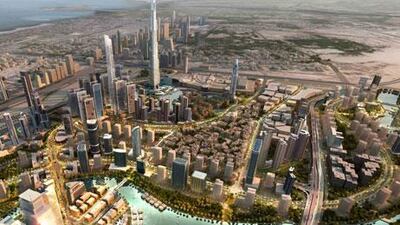DUBAI // Seven years from now, if the UAE wins its bid to host Expo 2020, 25 million visitors will arrive to find sweeping changes along its coast and motorways.
The future promises spectacular views from the world's highest Ferris wheel, recitals at a modernist opera house and boat rides across a canal that floats above a national motorway.
These and other dramatic structures are set to dominate the 2020 skyline - all backed by strong infrastructure in the form of the planned Etihad Rail network, Al Sufouh Tram and new Dubai Metro links. And that, experts say, is the foundation of a successful Expo 2020 bid.
"Physically, you can already see the movement on projects being regenerated and new ones started," said John Podaras, an independent hospitality consultant.
"Post-2009 we saw a freeze due to economic conditions globally and we're now seeing the resurgence."
Work on one the nation's biggest infrastructure undertakings, the Dh40 billion Etihad Rail project, has already begun and is scheduled for completion two years before Expo 2020.
The 1,200-kilometre rail network will not only link the hamlets, cities and industrial centres of the UAE, but will also form part of a rail corridor connecting Saudi Arabia in the west and Oman in the east with freight, and eventually passenger trains.
By next year, the Dh3.2bn Al Sufouh tram project - a 13-stop route linking to the Metro - is expected to be finished. And the area surrounding the Dubai Creek in Bur Dubai will be opened to foot traffic with a new bridge.
By as early as April, work will begin on the Dh1bn Dubai Eye - a 210-metre high Ferris wheel on an island suburb jutting out of Dubai Marina.
The wheel is the centrepiece of the Dh6bn Bluewaters project and will overlook a promenade with a traditional souq, homes and businesses.
Across the city, the Downtown Area surrounding the Burj Khalifa will be turned into a cultural district with a modern art museum, a contemporary opera house and design studios.
Cultural tourists will also find the completed Guggenheim, Louvre and National museums on Saadiyat Island in Abu Dhabi.
In what might be one of Dubai's most daring projects to date, a 2.8km extension of Business Bay Canal will travel over Sheikh Zayed Road and the Dubai Metro, down into Safa Park, through Jumeirah and out into the Arabian Gulf.
The engineering marvel will make use of a boat elevator, inspired by Scotland's Falkirk Wheel, to safely lift boats on to and down from an elevated waterway. The Dh1.5bn canal project also includes cycling and pedestrian tracks along its banks.
"It's much more about a global and holistic vision than individual developments," Mr Podaras said. "The delivery of more and more entertainment and integrated venues will extend the length of a tourist's stay."
Five theme parks are planned for Jebel Ali, the area closest to the proposed Expo 2020 site.
First on the cards will be a film-based fun park that will open next year, followed by a Bollywood park, a marine world, a fantasy land for children and a night safari park.
Next to Downtown Dubai, Mohammed Bin Rashid City will target the record books with the world's biggest mall, a garden project larger than London's Hyde Park and more than 100 hotels.
"The way things are moving, Dubai will be bigger in size with better facilities," said Dr Abdullah Alshamsi, an Emirati civil engineer and vice chancellor of the British University in Dubai.
"Dubai is a popular international hub and will be doubly so in 20 years' time. It will be a city for everyone because it satisfies everyone's desires.
"In 2020, I hope to see a complete city with cultural projects along side sport and entertainment."


